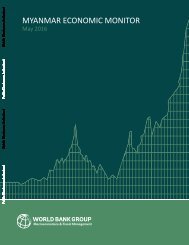Myanmar
1WZPRL1Jj
1WZPRL1Jj
- No tags were found...
You also want an ePaper? Increase the reach of your titles
YUMPU automatically turns print PDFs into web optimized ePapers that Google loves.
MYANMAR BUSINESS SURVEY: DATA ANALYSIS AND POLICY IMPLICATIONS<br />
Figure 3.28. Is technical or professional skill an issue?<br />
Other services<br />
Manufacturing<br />
Agriculture<br />
Hotels and restaurants<br />
Trade<br />
Extractive industries<br />
0 20 40 60 80 100<br />
Per cent<br />
Yes<br />
No<br />
Source: ESCAP-OECD-UMFCCI <strong>Myanmar</strong> Business Survey Database.<br />
Figure 3.29. Most frequent skills problems<br />
800<br />
Number of respondents<br />
600<br />
400<br />
200<br />
0<br />
Lack of adequate skills<br />
Labour costs are too high for skills needed<br />
Skilled employees move to work aboard<br />
Skilled employees move to other firms<br />
Skilled employees move to larger firms<br />
Skilled employees move to other sectors<br />
Source: ESCAP-OECD-UMFCCI <strong>Myanmar</strong> Business Survey Database.<br />
education as part of the overall reforms of the<br />
education system. Businesses can also contribute by<br />
forming partnerships with the Government in developing<br />
vocational training and research institutes.<br />
4. Computer and ICT skills are lacking at all levels<br />
Figure 3.30 shows that more than 25 per cent of<br />
the respondents indicated that their top management<br />
lacked adequate skills in the use of computers as<br />
well as information and communications technology<br />
(ICT). This result is mainly due to the large number<br />
of micro and small-sized firms in the sample who<br />
disproportionally have trouble hiring top management<br />
with these skills or, more likely, because the owners of<br />
those smaller entities lack such skills. Larger firms are<br />
more concerned about communications, interpersonal<br />
skills, work ethic, analytical thinking, finance and foreign<br />
language skills (figure 3.31).<br />
Lower down the corporate hierarchy, professionals and<br />
skilled workers are the most lacking in management<br />
and leadership skills. Addressing this deficiency requires<br />
the formation of additional higher education schools in<br />
related fields, such as business administration, legal<br />
and engineering (OECD, 2013). Greater cooperation<br />
between the dozen or so ministries responsible for<br />
education will be necessary for identifying future skills<br />
demands in <strong>Myanmar</strong> and for developing policies<br />
accordingly.<br />
5. Skilled worker shortages are mostly addressed through<br />
in-house training<br />
Most firms that had experienced a skills shortage<br />
chose to organize in-house training to upgrade the<br />
skills of their employees (figure 3.32). Very few firms<br />
reported relying on external training by public or private<br />
centres. In fact most firms do not cooperate with any<br />
38







